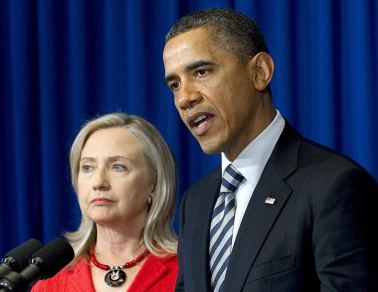Obama and Clinton answer for gaffes ahead of Pennsylvania
Washington -  Barack Obama and Hillary Clinton were made to answer for a series of recent stumbles on the campaign trail as the two faced off Wednesday in their one and only debate before the largest remaining Democratic presidential primary in Pennsylvania next week.
Barack Obama and Hillary Clinton were made to answer for a series of recent stumbles on the campaign trail as the two faced off Wednesday in their one and only debate before the largest remaining Democratic presidential primary in Pennsylvania next week.
With more than one month of material to work from since their last presidential debate, the two candidates both admitted to mistakes over the past weeks and pushed voters to look beyond the stories that have recently dominated US media coverage.
Former first lady Clinton admitted that she carried "a lot of baggage and everybody has rummaged through it for years," but argued it had made her battle-hardened and ready to tackle presumptive Republican nominee John McCain in the general election.
Obama said there will regularly be moments when messages are "imperfectly delivered," urging people to focus on the issues and become less "obsessed with gaffes."
On policy, both candidates committed to pulling all troops out of Iraq, regardless of the advice of military commanders on the ground, and promised retaliation should Iran ever consider an attack on Israel.
The debate in Philadelphia was the only one between the two candidates in the state of Pennsylvania, which will vote Tuesday after a one-and-a-half month break in the Democratic primary schedule.
Clinton won the last electoral contests in Texas and Ohio in early March and has consistently led Obama in Pennsylvania polls, thanks in part to the vocal support of popular state Governor Ed Rendell.
But recent opinion polls have shown that margin narrowing and observers believe Clinton needs a decisive victory to have any chance of overtaking Obama's lead in the number of total delegates needed to capture the nomination.
Obama was made to answer Wednesday for his recent controversial remark that many Americans living in small towns had become "bitter" over their economic situation, rejected politics and turned to religion and guns for comfort.
Clinton and McCain have both derided Obama as an "elitist" for the remarks. But Obama, who has based his campaign around bringing change to Washington, shot back that it was a practice of typical politics to take one poorly phrased statement and "beat it to death."
He also faced renewed questions about the racially incendiary remarks of his former pastor Jeremiah Wright Jr, who in sermons at his Chicago church said the US brought the September 11, 2001, attacks on itself, among other comments that Obama said were "extremely offensive."
Clinton charged that both issues showed there remained questions over Obama's candidacy, and said it would have been "intolerable" for her to have remained in Reverend Wright's church after hearing his remarks about September 11.
But Clinton also had to admit she was "embarrassed" and again apologized for her exaggerated portrayal of the danger she faced during a trip to Bosnia in the 1990s.
Clinton last month described "landing under sniper fire" during a visit to the Balkan country as first lady under former president Bill Clinton. Media footage of the arrival showed there was no such threat.
Both candidates again pledged to bring troops home from Iraq to ease the burden on the country's military and redouble efforts in Afghanistan and elsewhere. They rejected the suggestion that advice from US generals on the ground could change their mind.
"Thankfully we have a system in our country of civilian control of the military," Clinton said a week after the top US commander in Iraq, General David Petraeus, said Iraq had made progress that was "reversible" if the US cut troop levels too drastically.
"The commander in chief sets the mission. That's not the role of the generals," Obama said.
Obama and Clinton also said they were committed to keeping nuclear weapons out of the hands of Iran and would retaliate if the Islamic country attacked US ally Israel.
"An attack on Israel would incur massive retaliation from the United States," said Clinton, who added she was willing to offer the same guarantee to other Middle Eastern countries that would "forswear" nuclear weapons. (dpa)